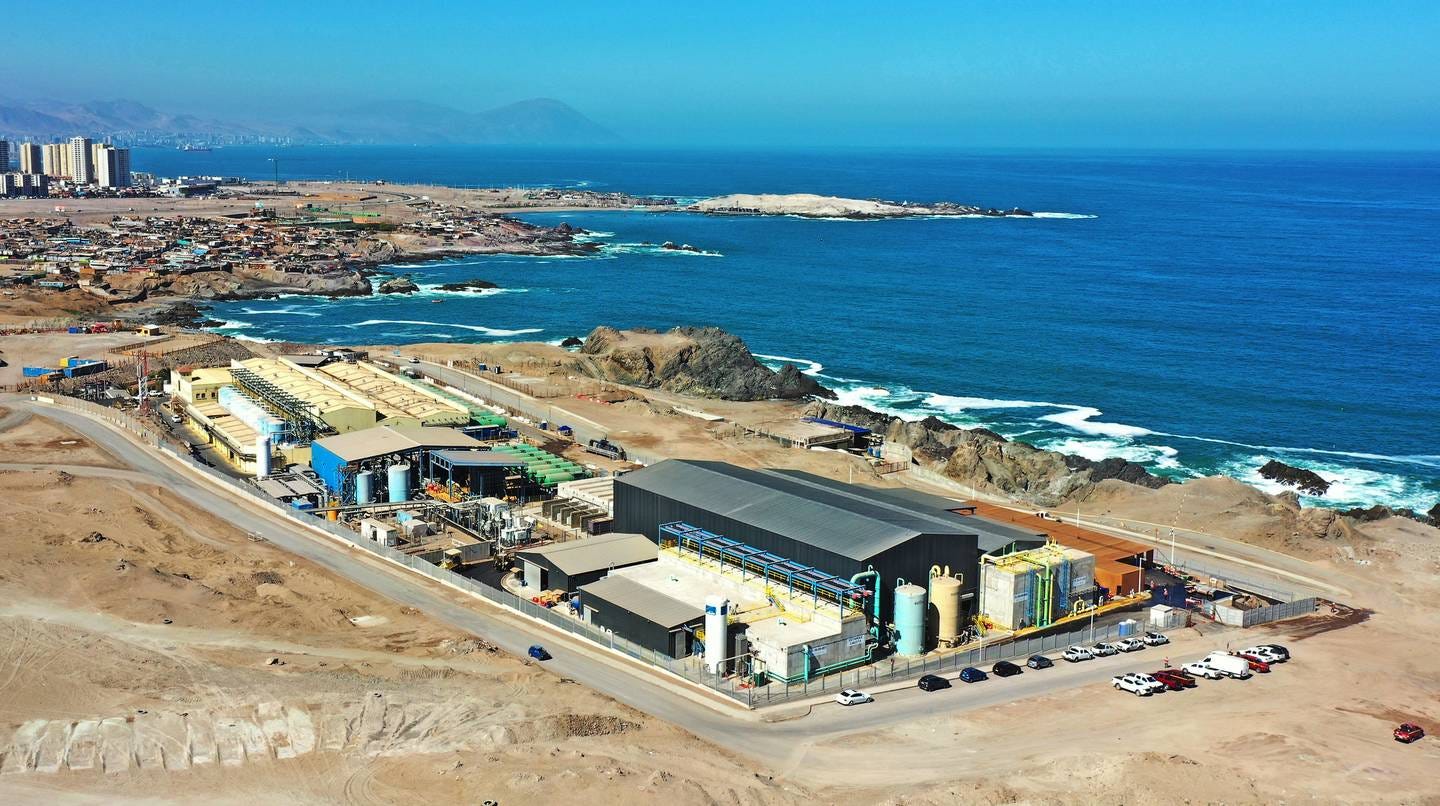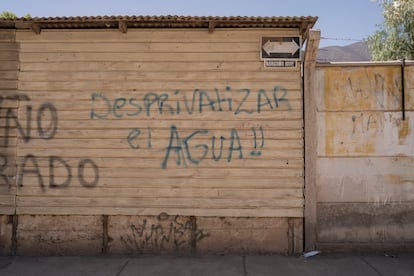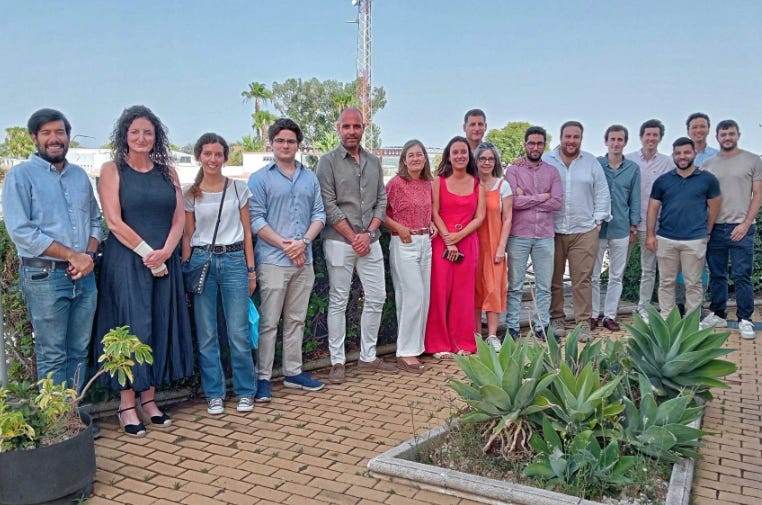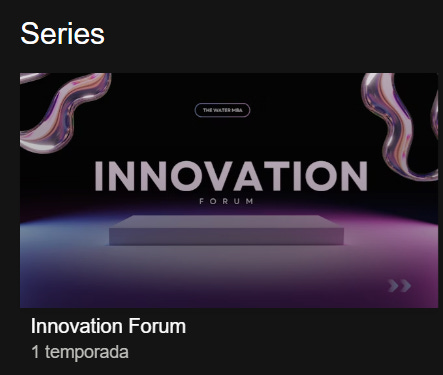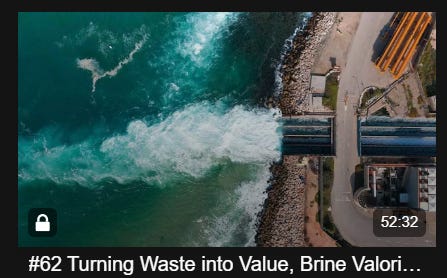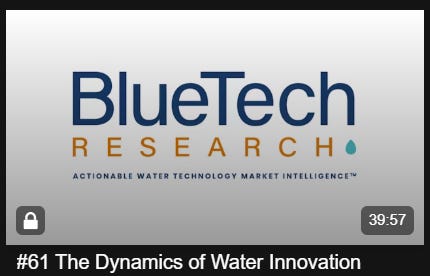What you don’t communicate doesn’t exist.
Why water needs a voice. From desalination to misinformation. Why water needs better storytelling. Not just engineers, why journalists like Carlos matter in water.
We’re opening the opportunity to include brief sponsorships at the beginning of our articles.
This helps us reinvest any revenue into new features, platform upgrades, and more learning opportunities for our growing community.
If you're interested or want more information → Be Our Sponsor
Communication matters
This is a reality, whether we like it or not.
Communication is no longer optiona, it’s fundamental.
We’re living through a transformation.
Communication channels are evolving.
What once appeared on radio, newspapers, or TV, now floods through social networks and alternative platforms.
Non-conventional marketing and digital storytelling are no longer the “future”, they’re the now.
At the heart of The Water MBA, communication is one of our fundamental pillars.
It’s not just about highlighting the big projects or spotlighting familiar names.
We also believe in making visible the invisible, the water professionals who may not be on center stage, but who deliver immense value to our industry.
Not everyone in water must be a chemical engineer or a civil engineer.
We’ve discussed before the importance of bringing in diverse talent: economists, contract managers, journalists, entrepreneurs, all of whom add depth and breadth to how we understand and manage water.
Meet Carlos Rubilar – journalist & water communicator
Today, I want to introduce Carlos Rubilar, a special guest who has been actively engaging with us for months.
He’s published thoughtful articles about water in Chile, and what stands out is his depth of research, humility, and commitment to clarity.
One of his phrases really stuck with me:
“What you do not communicate, does not exist.”
This captures exactly the challenge Chile, and many countries, face around water governance and public perception.
A curious case: Antofagasta
Let’s take Antofagasta, a region in Chile that relies almost 100% on desalinated water.
Yet, paradoxically, it has one of the highest rates of bottled water consumption in the country. Why?
Is it taste?
Is it a distrust in desalination as a technology?
Is it a lack of understanding about water quality and mineral content?
That’s where communication becomes vital.
Without it, people operate based on assumptions, myths, and fragmented narratives.
The water might be perfectly safe, but if no one knows that, it doesn’t matter.
The conversation itself becomes the solution.
A fake new?
I remember in November 2024, I was at a congress when someone from Chile stood up and said:
“Please help us. Water is not public, it’s a private resource.”
That comment spread confusion in my head. I immediately messaged Carlos:
“What’s this about?”
He replied right away, unpacking the context, history, and structure of water rights in Chile, clearly, calmly, and with nuance.
This kind of real-time dialogue is why we do what we do.
It helps us dig deeper than headlines and avoid being misled by oversimplified narratives.
Carlos also spoke about this in our episode, where we discuss how communication can drive transparency and meaningful reflection in our industry.
Visit to Potable Water Treatment Plant
A few days ago, I had the pleasure of visiting one of the major drinking water treatment plants together with the Young Water Professionals group.
We learned a lot, and activities like this are extremely important as a complement to digital learning.
Gathering with diverse, like-minded individuals, we addressed many topics, such as:
What problems do you face in your daily operations and maintenance (O&M)?
How are emerging contaminants being managed? They started to test up to 20 PFAS, results?
Has digitalization already been implemented?
What design flaws does the plant have? From design to operation, when things don’t work.
The details shall be disclosed in the near future.
The gap between society and us (water professionals)
Personally, I find it extremely challenging to raise and improve social awareness around our industry.
The return on “investment”, in both time and money, often feels unclear. Despite how essential water is to life, it rarely seems to rank among the public's priorities.
People assume someone will take care of it. It's so fundamental that its value becomes invisible, until it's at risk.
When I look at positive examples, they tend to come from places where the need has been acute.
Think Singapore, Israel, Australia, countries that have faced serious water scarcity and responded with strong public engagement and innovative policy.
But even in those cases, the focus is typically on ensuring availability, not broader discussions about ecosystems, water quality, or pricing, topics still far from the daily concerns of most citizens.
I was particularly struck by this video from PUB Singapore. They've done an impressive job building genuine public awareness around water. Almost 1 million views!!
There's a story behind their success, and we'll be unveiling it in an upcoming episode.
Is water boring?
Talking about communication, I cannot believe (well actually yes) what I saw this week.
Jesmond Alquilina, a European politician from Malta, fell asleep while the Spanish member was discussing the latest developments in water management in our region, including efficient irrigation, improved water quality, hydraulic infrastructure, upgraded wastewater treatment, and efforts to build a resilient water system that shapes the future...those things that we, as water peers, love discussing anytime.
This makes me reflect on a few things:
How far is water from being top-of-mind for society?
Do these parliamentary speeches really get heard, or are they just a formality?
Maybe he’s simply relaxed, knowing that Malta gets almost 70% of its water supply from desalination plants...
Spanish Desal & Reuse National Congress
As human beings, we have the unique power to shape our realities through communication, storytelling, and shared understanding, at least until AI fully takes over that role, which may become one of the greatest disruptions in human history.
AEDyR is one of the international institutions with the responsibility of shaping narratives and serving as a bridge to society.
Let’s take a look at the key topics put forward at AEDyR’s latest national congress, one of the sector’s most influential communication platforms, to get a sense of where the water business is heading, what opportunities may arise, and how our platform, The Water MBA, aligns with those trends.
This analysis also helps us identify whether The Water MBA is already covering some of these critical areas, and where we might need to expand or spark new conversations to address remaining gaps.
1. Global Collaboration
The international roundtable emphasized the urgent need for transnational cooperation, policy alignment, and institutional support to ensure water sustainability at a global level.
👉 We believe this point is already being addressed quite well internationally through The Water MBA, being read in more than 50 countries.
2. Emerging Pollutants
Sessions on water treatment highlighted the growing complexity of contaminants, from pharmaceuticals to PFAS and disinfection byproducts, requiring advanced materials, pilot testing, and holistic risk assessment.
👉 This must become a key topic in the 2025/2026 season (PFAS, pharmaceuticals, microplastics, etc.).
3. Desalination Must Be Greener and Smarter
Experts showcased real-world cases achieving energy consumption below 2 kWh/m³ by integrating renewables, optimizing reverse osmosis, and improving system design.
👉 Our platform is likely covering the desalination space quite comprehensively already. We expect indeed to launch a specific course in 2026.
4. Water Reuse Gaining Ground
From agriculture to urban industries, regenerated water is emerging as a cornerstone of water management, enabled by adaptable technologies, filtration (micro, nano, ultra,…), and circular economy approaches.
👉 This is, of course, one of our major forecasted topics for 2025/2026. This will be added to those already published such as Water Reuse for Agriculture in Israel, the Water Reuse market with Bluefield Research, etc.
5. R&D Bridging Science and Industrial Practice
Experimental systems like microbial desalination, membrane distillation hybrids, and solar-enhanced processes are advancing from lab scale to pre-commercial stages with promising outcomes.
👉 We have some content touching on topics like nanotechnology in water disinfection, but there’s definitely room for expansion and improvement. I hope we can bring innovative approaches to our specific channel during next years:
6. Digitalization Is Driving Performance Gains
AI, digital twins, and bioindication tools are enhancing precision, sustainability, and cost-efficiency in wastewater operations across a variety of use cases.
👉 We’ve started exploring this through episodes with Purecontrol, Infotiles, and others, laying the foundation for a deeper understanding of its value to utilities.
7. Brine Management Presents New Opportunities
Brine, traditionally seen as waste, is now being reimagined as a valuable source of commercial salts, critical minerals, and even renewable energy.
👉 Episode 62 addresses this very well, and we plan to dive deeper in the next season.
8. Regulatory Preparedness and Risk Planning Are Crucial
From certification frameworks to spatial planning tools like QGIS, the sector is aligning technical innovation with policy and territorial realities.
👉 While not yet covered through dedicated episodes, regulation and policy frequently surface in our conversations—e.g., Israel’s Water Law, the new EU Wastewater Directive. We’ll work to highlight these more explicitly moving forward.
9. Membrane Technologies Are Evolving Rapidly
Low-fouling membranes, textile-based pretreatment, and ozone/UV oxidation are extending membrane life and improving treatment outcomes.
👉 We’ve already addressed this with our episode featuring Aqua Membranes. Ozone oxidation deserves a dedicated episode, due to its quick implementation in major potable water treatment plants, and ceramic membranes will also be featured during next season.
10. Innovation Is Moving Fast, and Needs Support
The congress closed with a call for flexible funding, fast-track validation, and shared platforms to accelerate the transition from concept to real-world impact.
👉 Our episode with Paul O’Callaghan is an excellent entry point for understanding the innovation lifecycle—from inception to commercialization—and his book provides a powerful complement.
Our path forward
We need more voices, more dialogue, more trust in cross-disciplinary collaboration.
Engineers alone won’t solve water. Communicators won’t either.
But together, we move closer to clarity, inclusion, and innovation.
As an african proverb says "If you want to go fast, go alone. If you want to go far, go together."
I wanted this episode to be the final one that wraps up what has been an incredible journey, 64 episodes in the 2024/2025 season.
Probably more content than any water professional can reasonably handle in one go.
But I truly believe that if someone takes the time and has the patience to explore these conversations over a few months, you’ll grow, and you’ll learn.
Honestly, if you don’t, I’ll give you your time and money back.
This episode’s highlight is communication. Because that’s what we’re really trying to do here, talk, share, and grow together.
The Water MBA’s main focus and priorities will remain within the circle of water professionals, as they are the ones who can actually make things happen in the near future.
But let’s try also to work together to push water beyond the boundaries of our industry (energy, climate,…), into bigger agendas, policymaking, and everyday citizenship (despite I do not expect much success in this latest point…).
Because water doesn’t stay in our lanes, and neither should the conversation.
See you soon!
July and August will be our preparation period (phone calls, reading, research, time for “brain valorisation…”, etc) for the upcoming season starting in September/October 2025.
During these 2 months, you’ll receive special weekly articles covering some of our TOP episodes from 2024 that didn’t originally have dedicated write-ups.
I’ll also keep uploading specific episodes for our channels “Water Stories” and “Project Management”.


